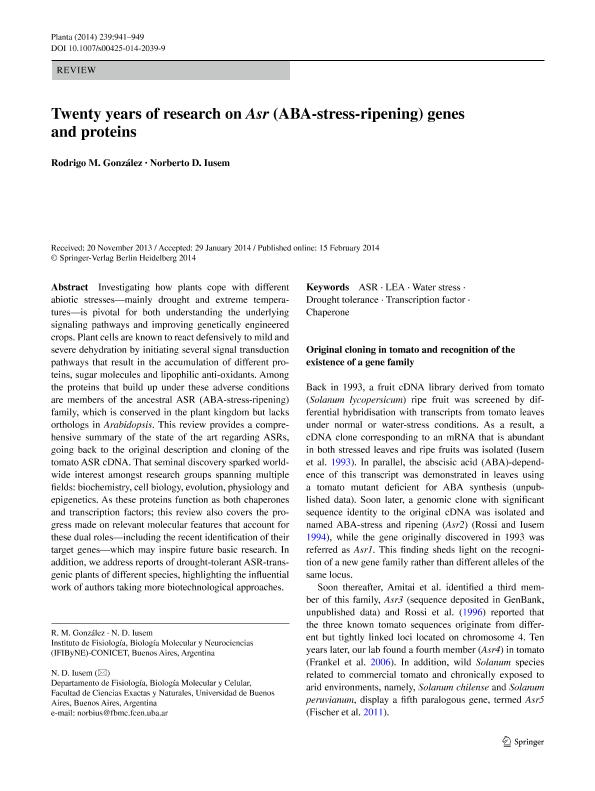Artículo
Twenty years of research on Asr (ABA‑stress‑ripening) genes and proteins
Fecha de publicación:
02/2014
Editorial:
Springer
Revista:
Planta
ISSN:
0032-0935
e-ISSN:
1432-2048
Idioma:
Inglés
Tipo de recurso:
Artículo publicado
Clasificación temática:
Resumen
Investigating how plants cope with different abiotic stresses—mainly drought and extreme temperatures—is pivotal for both understanding the underlying signaling pathways and improving genetically engineered crops. Plant cells are known to react defensively to mild and severe dehydration by initiating several signal transduction pathways that result in the accumulation of different proteins, sugar molecules and lipophilic anti-oxidants. Among the proteins that build up under these adverse conditions are members of the ancestral ASR (ABA-stress-ripening) family, which is conserved in the plant kingdom but lacks orthologs in Arabidopsis. This review provides a comprehensive summary of the state of the art regarding ASRs, going back to the original description and cloning of the tomato ASR cDNA. That seminal discovery sparked worldwide interest amongst research groups spanning multiple fields: biochemistry, cell biology, evolution, physiology and epigenetics. As these proteins function as both chaperones and transcription factors; this review also covers the progress made on relevant molecular features that account for these dual roles—including the recent identification of their target genes—which may inspire future basic research. In addition, we address reports of drought-tolerant ASR-transgenic plants of different species, highlighting the influential work of authors taking more biotechnological approaches.
Palabras clave:
Asr
,
Lea
,
Water Stress
,
Drought Tolerance
,
Transcription Factor
,
Chaperone
Archivos asociados
Licencia
Identificadores
Colecciones
Articulos(IFIBYNE)
Articulos de INST.DE FISIOL., BIOL.MOLECULAR Y NEUROCIENCIAS
Articulos de INST.DE FISIOL., BIOL.MOLECULAR Y NEUROCIENCIAS
Citación
González, Rodrigo Matías; Iusem, Norberto Daniel; Twenty years of research on Asr (ABA‑stress‑ripening) genes and proteins; Springer; Planta; 239; 5; 2-2014; 941-949
Compartir
Altmétricas




